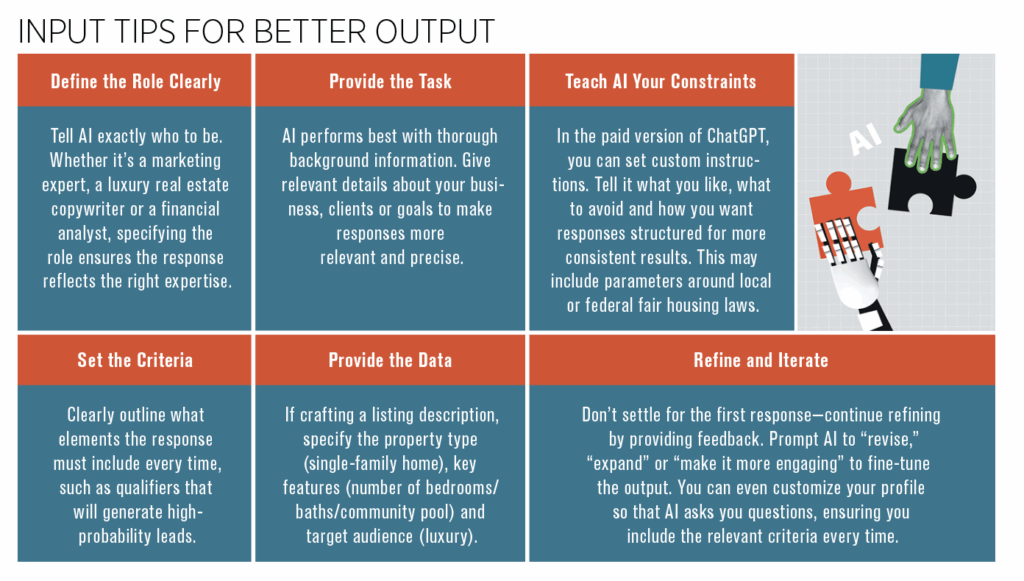By Rachel Arterberry
In the fast-paced world of real estate, client engagement plays a vital role in securing and closing deals.
With advancements in artificial intelligence (AI), real estate professionals now have access to tools that enhance efficiency, improve client interactions and optimize lead conversion. AI-powered CRMs are changing how agents connect with clients—from first touch to final handshake.
The Role of AI in CRM Systems
 Modern AI-powered CRM systems are changing the game for client engagement, making interactions smoother and more personalized. Unlike traditional platforms that depend on manual data entry and follow-ups, these smart systems analyze client data to spot trends and even predict future needs—helping businesses stay one step ahead.
Modern AI-powered CRM systems are changing the game for client engagement, making interactions smoother and more personalized. Unlike traditional platforms that depend on manual data entry and follow-ups, these smart systems analyze client data to spot trends and even predict future needs—helping businesses stay one step ahead.
Vandana Bhalla, CRS, a real estate professional licensed in Nevada and California, emphasizes the importance of this transformation. “You can take your CRM, your management system, as well as your AI—ChatGPT, Manychat or whatever system you’re utilizing—and then literally move the client base from one location to another pretty seamlessly,” she says.
These systems can:
- Automate client communication via chatbots and virtual assistants.
- Personalize engagement by analyzing client preferences and past interactions.
- Provide real-time data insights to optimize marketing and sales strategies.
- Reduce human error by streamlining workflows and automating repetitive tasks.
By integrating AI into CRM platforms, agents can ensure timely follow-ups, targeted messaging and improved relationship management without losing the personal touch that clients expect.
Predictive Analytics for Lead Scoring
One of the most innovative ways AI is being utilized in real estate is through predictive analytics for lead scoring. By analyzing data such as client behavior, browsing history and how often they interact, AI helps determine which leads are most likely to convert. This gives real estate agents the ability to:
- Prioritize high-quality leads, reducing time wasted on low-quality prospects.
- Utilize data-driven insights to craft customized outreach strategies.
- Increase conversion rates by focusing on high-probability leads.
Bhalla says that AI-driven insights help her business save time. “I have my assistant working with Manychat, ChatGPT and Canva,” she says. “We’re putting a lot of our systems in place that way. It saves hours and hours of time.” By using predictive analytics, agents can work more efficiently and focus their time and resources on leads most likely to close.

Automated Nurturing with Personalization
Finding the right balance between automation and a personal touch is key to building strong client relationships. AI-powered systems help automate lead nurturing while leaving room for those personal interactions. This includes:
- AI-generated email campaigns tailored to a client’s interests and previous interactions.
- Chatbots and virtual assistants that provide immediate responses to inquiries.
- Scheduling and managing social media content to keep engagement consistent.
“Even if my clients don’t respond the first time or the third time, staying in front of them consistently is key,” Bhalla says. “AI can help with that. Through platforms like Constant Contact, agents can create automated drip campaigns tailored to buyers, sellers and coaching clients, ensuring each interaction feels personalized while saving time.”
Agents still need to review and tweak AI content—it’s the only way to keep things authentic and personal. Bhalla advises agents to maintain control over AI-generated output. “Even if you allow AI to create the systems for you, you have to be the last touchpoint before you send it out because it really does need a human touch.” AI is a support system, but human oversight ensures trust and credibility remain intact.

The Shift from Traditional to AI-Driven Strategies
Bhalla encourages real estate agents to embrace AI tools gradually. “I teach a class on AI for real estate professionals where I tell agents, ‘Just use one. I don’t care which one—just start with one, come back to the class and then use another one.’”
It’s understandable that some agents might be hesitant about adopting CRMs, but AI’s ability to simplify workflows, predict market trends and personalize outreach makes it clear that the transition is here to stay. With AI, real estate professionals can streamline operations, respond faster and create even better client experiences. While some might worry that AI could replace them, it’s important to remember that AI can never take the place of agents when it comes to building meaningful relationships and offering expert advice.
AI-driven client engagement is changing the way real estate works—it’s no longer something of the future but a must-have tool for today. It’s giving agents amazing new ways to connect with clients more quickly and effectively. Just like Bhalla’s experience shows, using AI can truly transform the entire real estate process, from generating leads to closing deals, all while boosting efficiency and client satisfaction.
“AI helps reduce my time on tasks while making my work more effective,” she says. For real estate professionals looking to stay ahead, integrating AI-powered solutions is not just an option—it’s the future of client engagement.
“We’re only scratching the surface. In the near future, AI will act as a personal concierge—anticipating needs, scheduling showings and even pre-writing offers based on buyer intent. Agents who embrace AI now will have a serious competitive edge,” Bhalla concludes.
AI-powered CRM systems offer everything real estate professionals need to improve client interactions and drive successful deals, from predictive analytics for lead scoring to automated, personalized follow-ups. By embracing AI while keeping that personal touch, agents can stay ahead of the competition and provide exceptional service every step of the way, from lead to closing.
Discover our complete library of AI courses and webinars at crs.com/education.
Note: AI-generated content should always be reviewed, verified and personalized. Fact-check, tweak for authenticity and add a human touch before using it in client communications.








